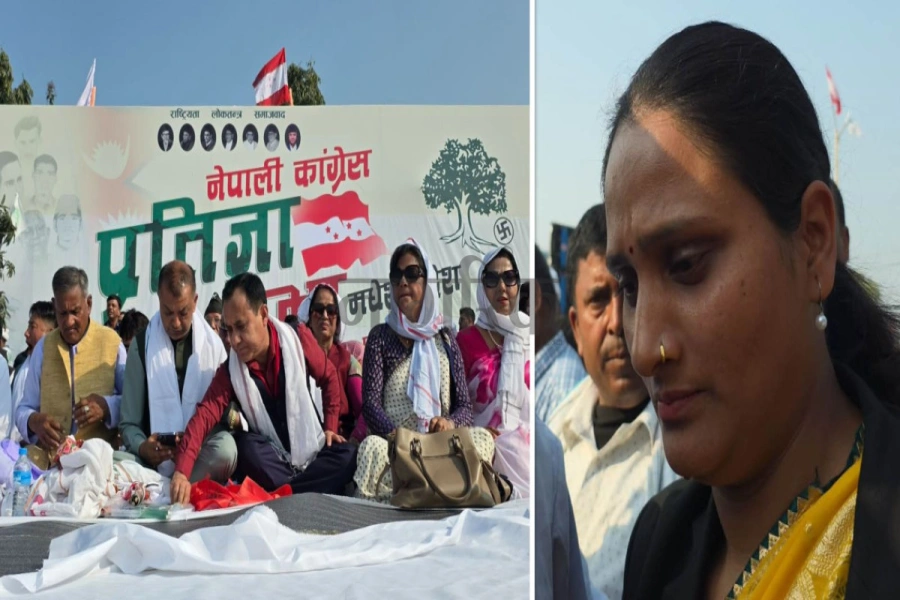With many kinds of tea available in the market, The Week attempted to better understand tea and all its myriad benefits and met up with Twistina Subba, of Kathmandu Tea Room in Jawalakhel, who helped shed light on the matter and also taught us how to correctly brew a good cuppa.
“Directly boiling tea leaves isn’t good for health,” she says. Instead you should let the boiling water settle down for 30 seconds up to a minute before adding the tea leaves. Green tea can be brewed at a lower temperature and you can wait for two minutes after boiling the water to get the best taste of the tea. In terms of tea leaves, you shouldn’t add milk or sugar to get the actual taste of the tea. The ‘normal’ tea we get in the market is called the CTC tea and it stands for ‘crush, tear, and curl’. Subba doesn’t advice people to drink this kind of tea for it contains a lot of chemicals and even includes pesticides.
“The only reason we have CTC tea in our tearoom is so that we don’t have to send our customers back empty handed. We don’t even make a profit out of it. I sell it at the wholesale value I buy it at,” she explains. Although meant for milk tea to give it more color, she advises people against boiling this as well.
All the different types of tea are made from the same leaves, the only difference is that they are plucked at different times and undergo different manufacturing processes. Studies have shown that tea has many health benefits and helping to fight cancer is one of the most important ones. It also aids bowel movements and helps indigestion. “There is no right time to drink tea, the Chinese drink it with every meal in their tiny cups, which is probably why they have such healthy skin,” says Subba. You can contact their store for a free tea tasting experience.
White tea
White tea leaves have a fine layer of fuzzy white hair on it that earns them the name. Most people who see it for the first time ask if the tea has gone bad. “The white fuzz on the leaves is actually a sign that it was picked at the correct time and that it has undergone very slight processing,” Subba says. They are plucked while they are still buds and dried. Since it is only very slightly oxidized, the fuzz doesn’t rub off.
It is considered good for health and Subba reveals that some of her clients have come back for more saying it helped lower their cholesterol levels. White tea has proven to have positive effects on oral hygiene and has anti-oxidants that have anti aging properties which help the skin look radiant.
Although there is nothing scientific about this, she recommends drinking it after dinner. She enjoys her white tea before bed and hopes that others will too.
Lack of conservation area for rare tea plant

Black tea
This tea gains its color from being fully oxidized. The strongest of all teas, it is the hardest to consume without sugar and most people, including Subba, end up taking the tea with a little bit of it.
The tearoom has different kinds of black tea, out of which golden honey tea and the ruby black looked the most enticing.
Golden honey tea gets its name from the gold tips that its leaves have as well as the bright honey color that is obtained while brewing the tea. The aroma it gives off too is very sweet, and that’s another reason why it’s called golden honey tea. The ruby black falls towards the red teas and, although it isn’t fully black, it is quite strong.
Black tea reduces plaque buildup and discourages the growth of harmful bacteria that cause tooth decay. Because of its higher caffeine level, it can keep you alert without giving you a kick that coffee might.
Oolong tea
Oolong tea falls in between black tea and green tea. It is only oxidized a little and the fermentation process is stopped as soon as the tea leaves start changing colors.
The tea is of Chinese origin and is believed that it came into existence when a man returning home from picking tea leaves ran into a ‘wūlóng’ which literally translates to a black dragon. Getting scared, this man ran away and the leaves scattered everywhere. The next day when he came back, the tea leaves had dried and opened a whole new door into the tea-world. The name in recent times changed from the Chinese character to Oolong.
Oolong tea is thought to have many health benefits. It is believed to aid digestion as well as promote healthy hair. Some of Subba’s customers have also come back for more when they felt this tea helped control their blood sugar levels.
Green tea
Green tea does not go through any withering process and therefore isn’t oxidized at all. Some of the ingredients that make this tea are thought to have anti inflammatory, antioxidant and anti-carcinogenic properties. It helps increase the metabolism rate of the body which have led to rumors that it helps people lose weight. “Although it is true that it aids weight loss, some people seem to think green tea is a slimming tea that will make you lose weight despite eating heavily and not exercising regularly,” says Subba. People suffering from hypertension should drink green tea early in the mornings, on an empty stomach, as it helps reduce blood pressure. Although people with low blood pressure don’t necessarily have to stay away from green tea, it is advised that they don’t drink it on an empty stomach.






































